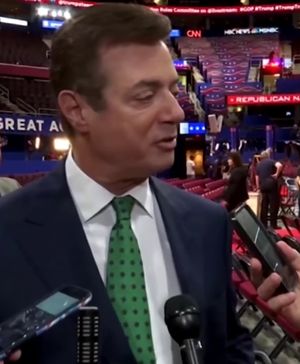Paul Manafort
(lawyer, lobbyist, deep state operative?) | |
|---|---|
 | |
| Born | Paul John Manafort Jr. 1949-04-01 New Britain, Connecticut, U.S. |
| Nationality | US |
| Alma mater | Georgetown University |
Criminal charge | counts of tax fraud, two counts of bank fraud, one count of failing to disclose a hidden foreign bank account, two counts of conspiracy |
Criminal status | Found guilty on 8 counts, pleaded guilty to counts of conspiracy, scheduled to be sentenced on February 8, 2019. |
| Children | Jess |
| Spouse | Kathleen Bond |
| Party | Republican |
American lobbyist, political consultant, lawyer, and convicted felon. | |
Paul Manafort is an American lobbyist, political consultant, lawyer, and convicted felon.
Russian connections
In 2017 Daniel Hopsicker wrote that "New evidence indicates that Oleg Deripaska, the Russian billionaire who paid $10 million a year to Paul Manafort between 2004 and 2009".[1] A poorly redacted court document revealed in January 2019 that he was accused of sharing 2016 election data "with a business associate accused of having ties to Russian intelligence".[2]
Career
Manafort was an adviser to the U.S. presidential campaigns of Republicans Gerald Ford, Ronald Reagan, George H. W. Bush, and Bob Dole. In 1980, he co-founded the Washington, D.C.-based lobbying firm Black, Manafort & Stone, along with Charles R. Black Jr, and Roger J. Stone,[3][4][5]
Related Quotation
| Page | Quote | Date |
|---|---|---|
| 2023 | “Last week’s indictment of McGonigal is a classic case of raising more questions than were answered. The evidence presented by prosecutors suggests the FBI counterintelligence expert wasn’t introduced to Deripaska until his waning days with the bureau in 2018, aided by a pair of Russian diplomats. In 2019, after he’d retired, the indictment says McGonigal went to work for the oligarch to help him evade U.S. sanctions and to investigate a rival. But the Times also reported that U.S. counterintelligence — in which McGonigal had been a key player — had tried unsuccessfully to recruit Deripaska as an asset in the years around the 2016 election.
Like the Woody Allen character Zelig, Deripaska — a 55-year-old aluminum magnate who at one time was the richest man in Putin’s Russia — is turning up in the background everywhere in the ongoing corruption of American democracy. The oligarch’s history of multimillion-dollar business dealings with Paul Manafort — Trump’s campaign manager in the summer of 2016 — is central to the theory of Russian interference, after it was confirmed that Manafort shared key campaign data with a suspected Russian intelligence agent also connected to Deripaska. In 2019, Deripaska did manage to get those U.S. sanctions lifted, in a controversial deal backed not only by Team Trump but critically by then-Senate Majority Leader Mitch McConnell. That same year, a Deripaska-linked aluminium company announced it would build a large plant in Kentucky, where McConnell was running for re-election. (It eventually wasn’t built.) This is the same McConnell who, during that critical fall period in 2016, refused to sign a bipartisan statement warning about Russian election interference.” | January 2023 |
Related Documents
| Title | Type | Publication date | Author(s) | Description |
|---|---|---|---|---|
| Document:Muellergate and the Discreet Lies of the Bourgeoisie | Blog post | 1 April 2019 | Craig Murray | The capacity of the mainstream media repeatedly to promote the myth that Russia caused Clinton’s defeat, while never mentioning what the information was that had been so damaging to Hillary, should be alarming to anybody under the illusion that we have a working “free media”. |
| Document:The Assange Arrest is a Warning From History | Article | 12 April 2019 | John Pilger | Leni Riefenstahl, close friend of Adolf Hitler, whose films helped cast the Nazi spell over Germany told me that the message in her films, the propaganda, was dependent not on “orders from above” but on what she called the “submissive void” of the public: "When people no longer ask serious questions, they are submissive and malleable. Anything can happen.” |
References
- ↑ http://www.madcowprod.com/2017/03/31/russian-oligarch-election-probe-linked-drug-cartel/
- ↑ https://www.timesofisrael.com/manafort-accused-of-sharing-2016-election-data-with-russians/
- ↑ http://campaignstops.blogs.nytimes.com/2012/05/14/the-lobbyist-in-the-gray-flannel-suit/
- ↑ https://www.nytimes.com/1989/06/21/us/a-political-power-broker.html
- ↑ https://web.archive.org/web/20180615191143/https://www.fara.gov/docs/3600-Exhibit-AB-19851101-D0XCT601.pdf